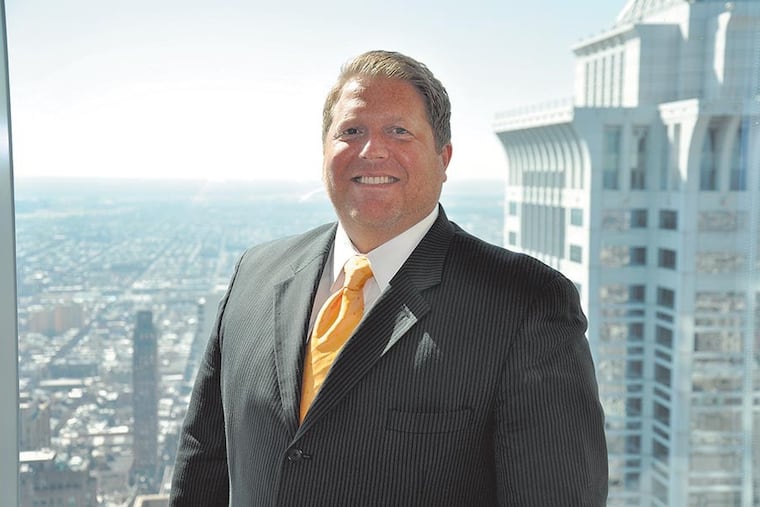Comcast executive, LGBTQ liaison claims company discriminated against him for being gay
Klayton Fennell claims that Comcast demonstrated repeated bias against him over his 18 years with the company.

A Comcast Corp. executive who served as the media giant’s “key contact” to LGBTQ groups claims he was discriminated against for being gay, alleging he was called derogatory names, passed over for promotions, denied equal pay, and encouraged to leave the Philadelphia headquarters — all while being asked to publicly represent Comcast’s diversity efforts.
In a federal lawsuit filed this month, Klayton Fennell, a senior vice president of government affairs and principal for LGBTQ external affairs, claims that Comcast and some of its leaders demonstrated bias against him over his 18 years with the company “because of his sexual orientation and because he does not conform to gender-based stereotypes."
Comcast, which ranked No. 2 on Fortune’s top 100 places to work in 2018, denied the senior vice president’s claims, writing in a statement that “at no time during Klay Fennell’s long career at Comcast has he been discriminated against or been the subject of wrongful treatment.” The company said it would “vigorously defend” itself against the claims.
“Comcast has a longstanding commitment to the LGBTQ community and has been widely recognized for its inclusive culture,” a company spokesperson wrote in an email. “We also have supported [Fennell] for many years and provided a platform for him to have a positive influence on LGBTQ initiatives both inside the company and in the communities we serve.”
Fennell, who began working for Comcast in Florida in 2001, asserts in the 45-page lawsuit that he was called a homophobic slur by a fellow employee, told by an executive coaching firm that he was “too gay and flamboyant” for Comcast’s “conservative” culture, and encouraged to take a demotion to transfer to the San Francisco office where it was more “acceptable” to be gay.
According to the lawsuit, as Fennell rose in the company’s ranks, he became a public representative of Comcast’s LGBTQ-friendly culture, telling Philadelphia Gay News in 2014 that he was proud of the company’s consistent 100% “Best Place to Work” rating from the Human Rights Campaign. In 2015, he was recognized by the Philadelphia Business Journal as a “Top LGBT Leader in Business.” And in February 2019, he represented Comcast at an event in Nashville, where the city’s mayor signed an executive order in support of LGBTQ-owned businesses.
But, back in Philadelphia, Fennell’s lawsuit alleges, he was subjected to a less-welcoming work environment. Fennell claims that despite being one of the longer-tenured senior vice presidents at the company, he was still paid less than his coworkers due to his sexuality and gender presentation. He further claimed that his lower pay made him ineligible for a compensation benefit offered to senior leaders.
When he asked to be paid in-line with his heterosexual, male-conforming senior vice president peers, Fennell claims a human relations manager told him that Comcast’s senior leaders, including David Cohen, senior executive vice president and chief diversity officer, viewed him as “high pitched” and that it was impacting his career trajectory.
Fennell also claims that D’Arcy Rudnay, Comcast’s chief communications officer, allegedly “announced to all in attendance” at a 2016 executive-level meeting that Fennell reminded her of the openly gay ice skater Johnny Weir, although the two bear no physical resemblance, according to the suit.
When Fennell took his claims of discrimination to the Philadelphia Commission on Human Relations in 2018, the complaint alleges, he was met with “intensified” discriminatory treatment, including exclusion from meetings, increased workload, and being told his management style was under investigation.
Whether sexual orientation and gender identity are protected from discrimination under the Civil Rights Act of 1964 is currently under review by the U.S. Supreme Court. In Pennsylvania, state law simply says someone can’t be discriminated against on the basis of sex, but some municipalities, including Philadelphia, recognize sexual orientation and gender identity as protected.
The lawsuit seeks unspecified damages, including back-pay, front-pay, compensatory damages, and lawyer’s fees.
Fennell and his lawyer, Katherine Oeltjen, declined comment.
Comcast has won awards in recent years for diversity and inclusion, including a No. 2 ranking on Fortune magazine’s “Best Workplaces for Diversity,” and being commended for its LGBTQ inclusion efforts on Cablefax’s 2019 Work Culture List. The company earned a perfect score on the Human Rights Campaign’s Corporate Equality Index for six straight years and was named a Best Place to Work for LGBTQ Equality.
Sixty-two percent of its employees were women or people of color as of 2018, and 71 percent of new hires last year were diverse, according to a company report. The report did not have data on its LGBTQ workforce.
According to a 2018 national workplace study from the Human Rights Campaign, nearly half of LGBTQ people remain closeted at their workplace due to “often-intangible, nuanced issues.”
Other lawsuits regarding workplace discrimination based on sexual orientation include pending cases in Missouri, Georgia, and New York, according to Freedom for All Americans, which advocates for nondiscrimination of LGBTQ people. In June, Goldman Sachs was sued by a gay former executive who claimed he was fired by the Wall Street bank after complaining about managers’ discriminatory conduct.